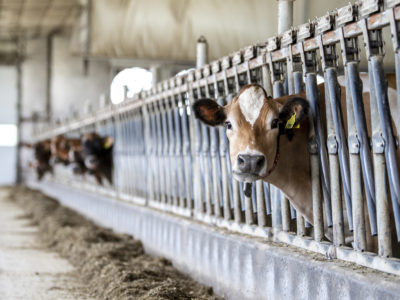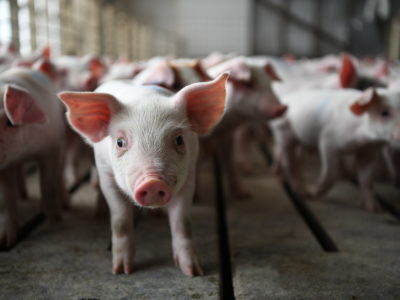Rules and Regulations
Larger livestock farms are more regulated than smaller livestock farms, but all livestock farmers must adhere to regulations, including set-back distances and water-protection rules.
The Coalition can help you navigate through the hundreds of pages of rules to make sure your farm is in compliance. We can answer many questions over the phone at 1-800-932-2436, but even better is to have us visit your farm, at no charge, for a thorough review of your particular situation.
Resources
Agricultural best management practices help minimize air, soil and water pollution. Plant nutrients, bacteria, sediment and crop chemicals can be mitigated so that pollution of ground and surface water is curtailed. Livestock odors can also be minimized. A goal of the Coalition to Support Iowa’s Farmers is to help farmers implement sustainable farming practices that assist Iowa farm families in raising livestock responsibly and successfully.
Before construction of any new livestock farm can begin, check to see if a Manure Management Plan (MMP) needs to be filed and approved. There are many resources to help farmers implement best management practices.
GENERAL RESOURCES
ENVIRONMENTAL PROTECTION AGENCY
- AgSTAR Program
- Animal Feeding Operations, Best Management Practices
- Iowa Commercial Nutrient Applicators Association
IOWA STATE UNIVERSITY EXTENSION
IOWA STATE UNIVERSITY/IOWA MANURE MANAGEMENT ACTION GROUP
- Commercial Manure Applicators
- Manure and Nutrient Plans, Permits, Regulations
- Manure Management and Testing Service Providers
NATURAL RESOURCES CONSERVATION SERVICES
- Animal Feeding Operations and Confined Animal Feeding Operation Information
- Electronic Field Office Technical Guides
- Information for Farmers
UNITED STATES DEPARTMENT OF AGRICULTURE
On September 11, 2013, EPA Region 7 and the Iowa DNR signed a “work plan agreement” that established guidelines for evaluations of livestock and poultry farms. The work plan stems from a petition filed by environmental groups in 2007, claiming DNR does not comply with the Clean Water Act and that the EPA should take over the National Pollutant Discharge Elimination System (NPDES) program. This agreement is designed to strengthen Iowa’s implementation of the federally authorized NPDES program and is an important step toward retaining authority to implement the federal program in Iowa.
The work plan obligates DNR to evaluate livestock farms larger than 300 animal units and document whether the farms are in compliance with the Clean Water Act. It is estimated that over 8,500 livestock farms will be evaluated in the next five years.
“Livestock regulations are complex, sometimes ambiguous and are constantly changing,” says CSIF Executive Director Brian Waddingham. “For Iowa’s livestock and poultry farms to prosper, farmers must know and understand state and federal regulations and the resources available to help them remain viable on the land for generations to come. The resources below will help livestock farmers better understand how the work plan agreement will affect them and their farm.”
Webinar Recording: Click here to access the video recording
Welcome and Resources To Help Farmers Worried About An Inspection
Brian Waddingham, CSIF Executive Director
Iowa DNR Explains the Workplan
Ken Hessenius, Iowa DNR supervisor from Field Office 3 in Spencer
How the Workplan Impacts Your Farm
Eldon McAfee, attorney for Beving, Swanson and Forrest
Chris Gruenhagen, government relations counsel for the Iowa Farm Bureau
Question and Answer
Additional Resources: A Lender’s Perspective (video)
Jim Knuth, Senior Vice President, Farm Credit Services of America
EQIP Funding Available to Help Farmers Make Changes (video)
Paul Goldsmith, EQIP Coordinator, Iowa NRCS
Low-Interest Financing Through State Revolving Loan Fund (video)
Checklist to Prepare Your Farm For a DNR or EPA Inspection (PDF)
For more information, or to set-up a no-cost, confidential farm consultation, contact the Coalition to Support Iowa’s Farmers here or by calling 800-932-2436.
While Iowans strongly support farmers and give them high marks for trustworthiness and importance, they do have questions related to specific farming practices. These may include such topics as odor, water quality, property values, use of roads and bridges and proximity of other farms. These factors make proper siting of a new livestock barn critical.
The Coalition to Support Iowa’s Farmers can assist you with a site analysis. A thorough analysis takes into account the location of neighbors, public use areas like parks and lakes, topography and prevailing wind directions. When considering potential building sites, be mindful that Iowa’s prevailing winds, especially during spring and summer, blow from the southeast to northwest. Potential livestock odor can be managed with proper siting and various other solutions. When considering various forms of odor control, ask these questions:
- Where is the odor primarily coming from?
- Is the system affordable?
- Does it provide the best results for the money?
- What can I realistically expect it to accomplish?
- Can I manage this system effectively on my farm?
The most effective odor control will always be a combination of techniques designed to fit each specific farm. Many resources are available via the links below to help you choose the optimum location for your livestock farm as well as information on odor mitigation.
Iowa State University Extension
Pork Information Gateway
In addition, the Green Farmstead Partner Program, sponsored by the Coalition to Support Iowa’s Farmers with the help of the Iowa Nursery and Landscape Association, helps livestock farmers improve water and air quality, reduce odor, improve aesthetics and enhance neighbor and community relations.
Anyone can become a criminal’s target. Since thieves and vandals look to wreak havoc without being seen, taking much time or making much noise, farms located in remote, rural areas can appear to be easy targets.
Most people assume they are safe – but that is not necessarily the case. Every year, the Coalition to Support Iowa’s Farmers receives numerous reports of livestock theft and/or vandalism. It is important for every farmer to stop and take time to think about the security measures they have – or don’t have – in place.
The Coalition and law enforcement officials encourage farmers to be proactive and take steps to better protect their farm and livestock, even if they are not aware of any criminal activity in their neighborhood.
For prevention tips and suggestions of what to do if you are a victim, read more here.
Additionally, video clips from a presentation given at the 2011 World Pork Expo on this topic are available.
Species Specific
Building a Bright Future
The Coalition to Support Iowa’s Farmers (CSIF) knows farming and raising livestock takes hard work, dedication and comes with its own unique set of challenges. Staff members are available to help Iowa farm families build a bright future – from explaining rules and regulations, to helping find the best site for a new facility, CSIF truly works beside farmers from start to finish.
To learn more, watch this time-lapse video of a hog barn being built.


